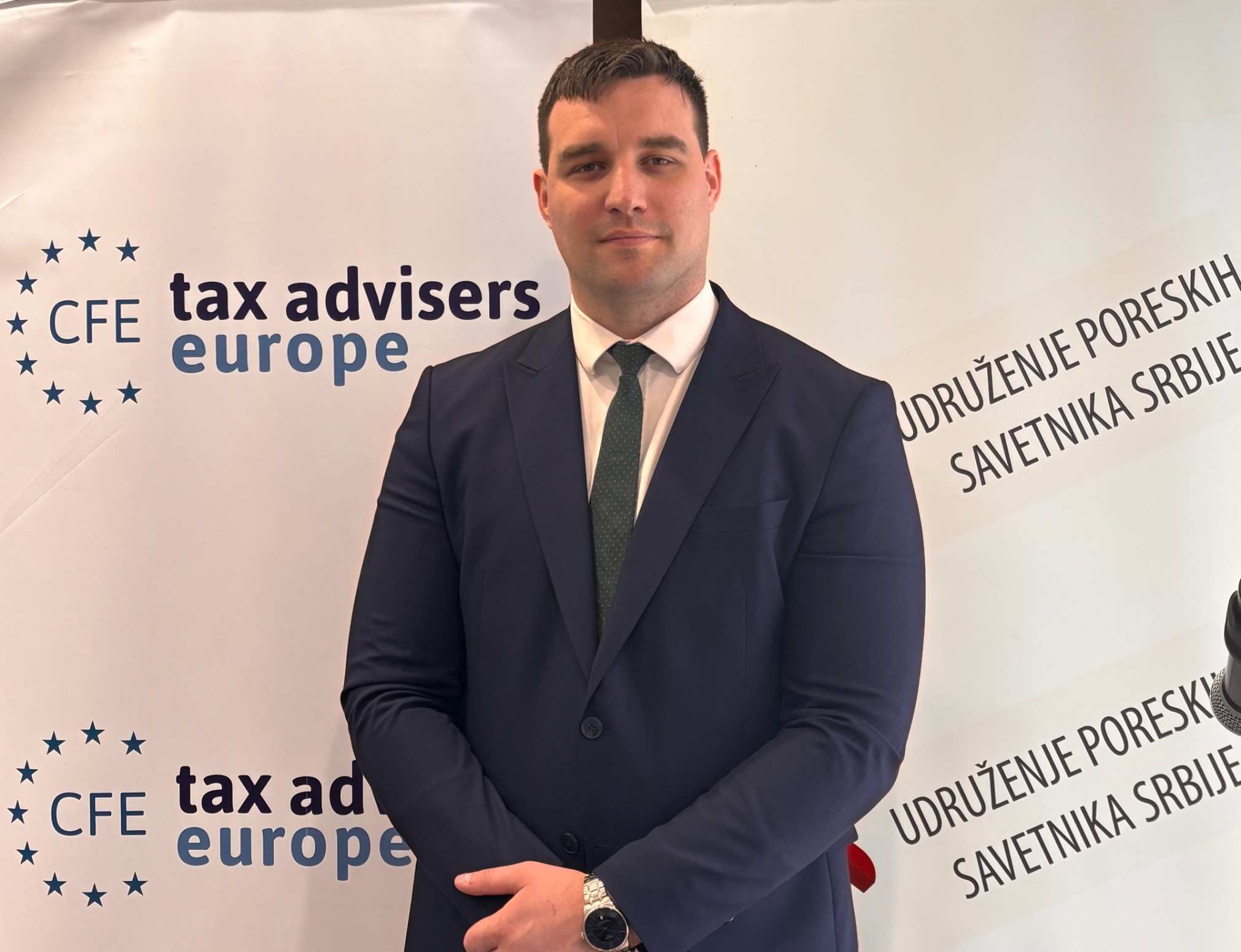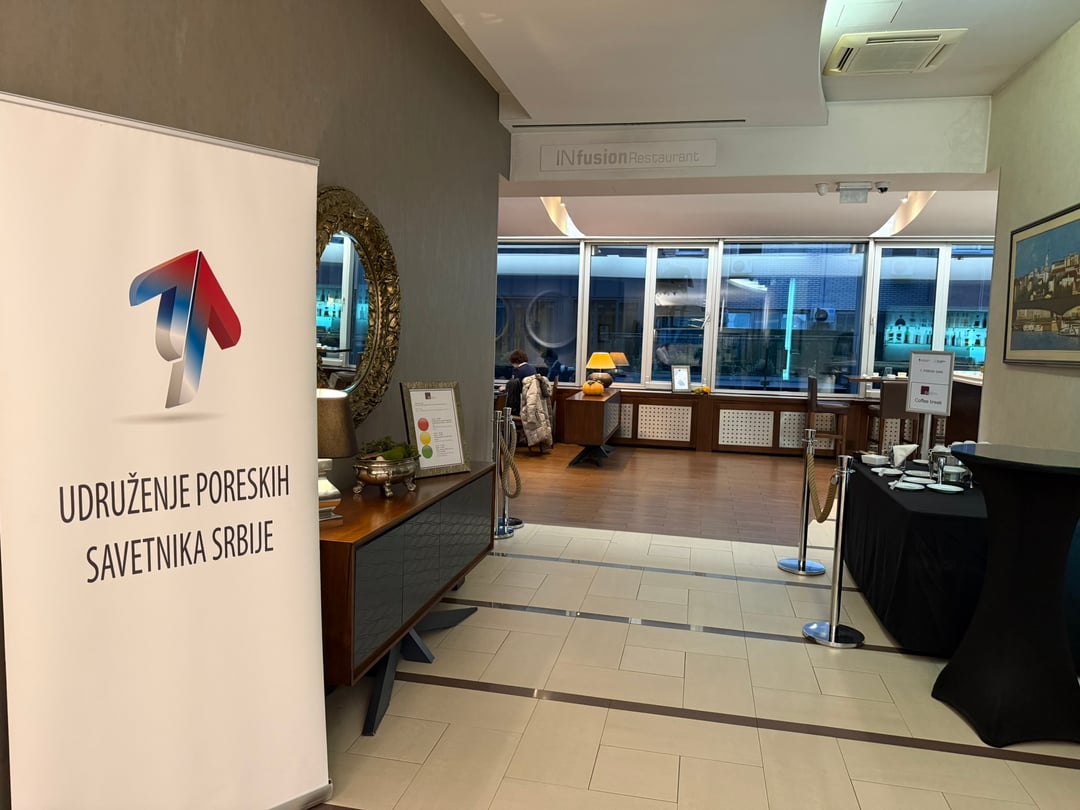
Mr Kristijan Karan, Attorney-at-Law, participated in the 11th International Congress of Tax Advisers, held on 30–31 May 2025 in Belgrade.
The congress was organised by the Association of Tax Advisors of Serbia in cooperation with CFE Tax Advisers Europe.
Some of the topics discussed at the Congress included: Corporate income tax in an era of uncertainty – Trump’s policy and the fate of Pillars 1 and 2 (MSc Nataša Dobrosavljević); Tax aspects of corporate restructurings through mergers and acquisitions (MSc Zoran Janković); Electronic consignment notes (Aleksandar Vasić); The tax route to confiscating assets without proof of origin (Dr Minja Đokić); Refund of foreign VAT for legal entities, with reference to EU Directives 8 and 13 (Mirko Vincetić); Application of tax incentives under Article 21 of the Personal Income Tax Act and Article 45ž of the Contributions Act (Dr Vesna Nešić); Accounting treatment of research and development expenditures in accordance with the Rulebook of the Ministry of Finance of the Republic of Serbia for IFRS and IFRS for SMEs; Case-law in tax proceedings in the Republic of Slovenia (Mag. Ivan Simič); Specific VAT rules for the construction sector (Predrag Petrović), together with many other practical and topical issues.
One of the most compelling topics for our firm was the analysis of the tax aspects of corporate reorganisations—mergers by absorption and amalgamations. From a practical standpoint, Article 24 of the Property Taxes Act stipulates that a transfer of the entire assets of a legal entity is deemed a consideration-based transfer and is therefore, as a rule, subject to the tax on absolute rights; however, where the shareholders receive only shares or interests and any cash component does not exceed 10 % of their nominal value, that tax does not apply. Furthermore, Article 24a introduces exemptions for reorganisations carried out in accordance with the Companies Act, while Article 72a of the Personal Income Tax Act explicitly provides that no capital gain arises from a share swap effected in the course of a merger, provided the cash payment does not exceed 10 % of the aggregate book value of the shares exchanged. Case-law reinforces this position: in judgment U-1234/2021 the Administrative Court of the Republic of Serbia confirmed the right of the absorbing company to carry forward and utilise the accumulated tax losses of the absorbed company, provided the statutory conditions are met. These examples illustrate how essential a detailed tax analysis is when planning status changes, as the correct application of exemptions can have a direct impact on the overall tax burden and the future liquidity of the newly-formed entity.
Another highly interesting and practical topic we discussed concerns the “tax route” to confiscating assets without proof of origin – a mechanism introduced by the Law on Determining the Origin of Property and Special Tax. Although the title refers to “origin”, in practice the tax authority examines the increase in an individual’s assets: first, in the preliminary phase, it need only make it plausible that an increase exists; in the ensuing audit, the burden of proving lawful acquisition shifts entirely to the taxpayer, and an appeal (which suspends enforcement) turns into administrative litigation if the dispute is not resolved. The taxable base is imprecisely defined – categories of assets, income and “something in between” are mingled – while the rate is confiscatory: 75 % on any unexplained increment. Thus, if the value of assets rises from €250,000 on day one of the reference period to €10 million on the last day, the positive difference is €9.75 million; after excluding gifts, inheritances or declared income, the remainder is taxed, and any residual amount (e.g. €1,027,500 after tax) may be seized only upon a final criminal conviction for an offence. This raises numerous substantive and procedural issues – from the principle of taxation according to economic capacity, through the ill-defined taxpayer and tax object, to overlaps with confiscation of proceeds in criminal law – which is why our firm consistently advises clients to seek timely tax and legal analysis before encountering such proceedings in practice.
During the Congress, the 13th regular Assembly of the Association of Tax Advisors of Serbia was also held.
As a law firm specialising in commercial and international business law, we consider ongoing professional development in tax law to be essential for delivering high-quality, comprehensive legal support to business entities. In line with this commitment, Mr Karan became a member of the Association of Tax Advisors of Serbia earlier this year, thereby further demonstrating our firm’s dedication to an integrated, multidisciplinary approach to safeguarding the interests of our entrepreneurial clients.
Author: Law Office of Kristijan Karan
Published: 8. June 2025
Latest News & Publications

Publication
Serbia–Estonia Double Taxation Agreement (DTA) on Income Taxes

News
Kristijan Karan Elected Chairman of the Statutory Commission of the Serbian Tax Advisers Association

Publication



